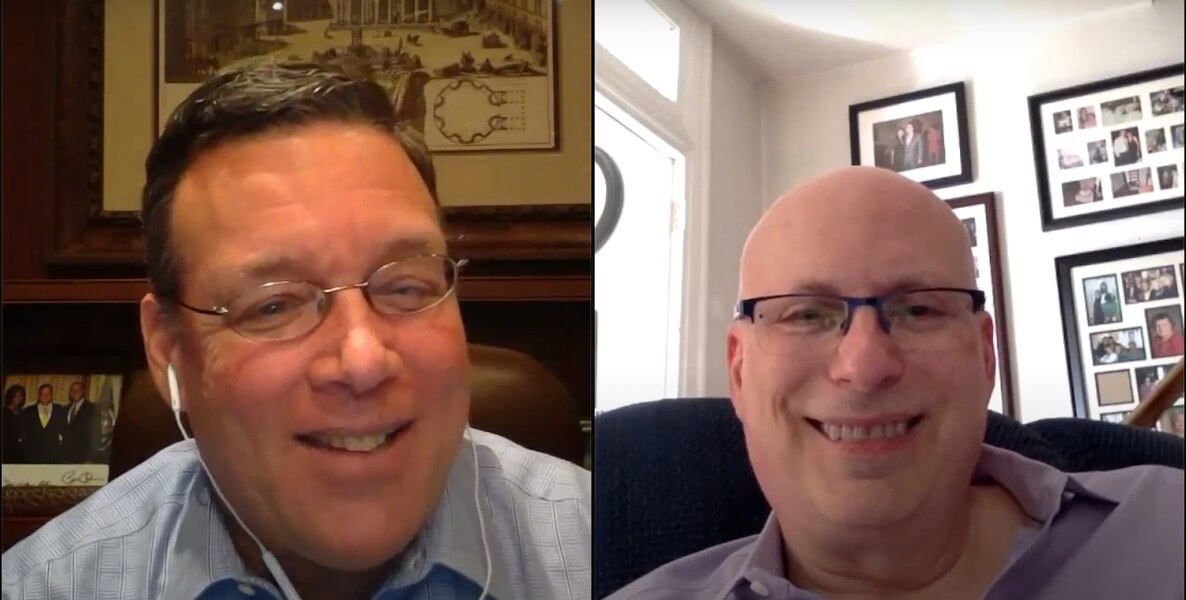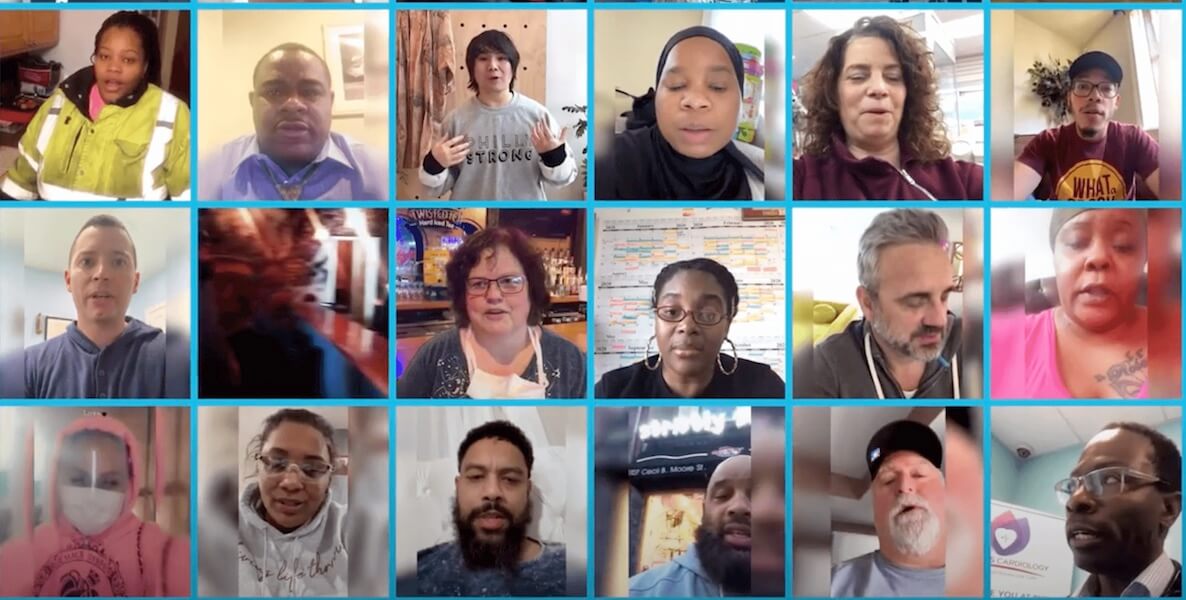You have to wonder when—if!—Jeff Brown ever sleeps.
The CEO of Brown’s Super Stores, which includes 12 local supermarkets, many in food deserts, has his hands and heart invested in a staggering array of meaningful projects around Philly.
And on Thursday night, he joined Citizen co-founder Larry Platt for a virtual chat to talk about the lessons he’s learned throughout his lifetime in the grocery business—his dad co-owned a bodega at 40th and Girard, where Brown started working when he was eight years old—the pathways he’s carved to employ and empower youth and returning citizens, and what it would take to get him to run for office.
Keep reading for a mere sampling of the impact Brown is having on our city, or you can watch the full conversation here.
And be sure to join The Citizen’s upcoming virtual events—they’re free, but you must RSVP here.
1. He bridges racial divides.
When Brown started working in his dad’s store at age eight, he and his father were among the only white people alongside mostly Black employees and customers. “It was a very diverse situation, but that was normal to us. That’s how it was,” he recalled.
Still, as CEO he wasn’t naive: He recognized the understandable suspicion between Black and white communities. Instead of shying away from it, he dug in. “We had to figure out a way to bring us all together as a team,” he said. “We had to have a purpose or a mission that was beyond the business transaction, that we all could buy into.”
He brought together staff from every level of his workforce to think about what they did every day, and what they wanted to do. “Ultimately, we figured out that we’re not just a grocer; we’re there to bring joy to the lives of the people we serve,” he said.
“My relationship, especially with the Black community has always been like that: It’s always been special, it’s been loving from many many decades, and we’ve helped each other. And my view of this world is a lot different than most people because of that experience.”
2. He nurtures his customers’ diversity.
Historically speaking, most grocery stores fail in food deserts, the kinds of impoverished communities where Brown’s stores are typically located. So how did Brown overcome that pattern?
“This is something that I worked on a lot with [the late Citizen chairman] Jeremy Nowak. We knew that almost all supermarkets went out of business in food deserts…and there had to be a financial reason for that, a business model reason,” Brown shared. He and Nowak figured out that there’s about a five percent financial gap in serving the poor versus serving a middle-income community.
“Once we realized that this isn’t a racism issue, this is a finance issue and it needs to be solved with a finance solution, that’s when Jeremy and I got to work on the Fresh Food Financing Initiative to develop public/private partnerships to mitigate some of that gap.”
The far more interesting part of the solution, he said, is about just being a good entrepreneur. “It doesn’t really matter someone’s race, it doesn’t matter what income they have; you’re there to solve problems, you’re there to serve,” he said.
Brown started holding town hall-style meetings to understand what other grocers did wrong, and customers shared the ways in which they were treated poorly, the lack of quality food options, how unclean the stores were. They also shared their values.
![]() “What the grocery industry missed is they didn’t carry anything that was significant to their culture,” Brown said. So he started carrying halal meat for his Muslim customers, fufu for his Western African shoppers, kosher food for his Jewish guests. “We went on a journey of understanding our customers, their religion, the things they celebrated, and one by one we figured out how to do what it is they wanted done, that none of my competitors still to this day have even tried to emulate.”
“What the grocery industry missed is they didn’t carry anything that was significant to their culture,” Brown said. So he started carrying halal meat for his Muslim customers, fufu for his Western African shoppers, kosher food for his Jewish guests. “We went on a journey of understanding our customers, their religion, the things they celebrated, and one by one we figured out how to do what it is they wanted done, that none of my competitors still to this day have even tried to emulate.”
3. He supports returning citizens.
Of Brown’s 2,500-person workforce, approximately 700 employees are formerly-incarcerated individuals. His commitment to hiring returning citizens started about 15 years ago, when the idea was proposed to him in another town hall-style meeting.
He was asked by the community to figure out a way to show the world that returning citizens are not permanently broken. Uplift, the nonprofit Brown founded, also provides job-training to formerly incarcerated individuals and people who are still incarcerated.
“We went and hired six returning citizens. That was our experiment,” he said. “And we were very open-minded about it, we didn’t pre-judge it, because we didn’t know what we were getting into.”
What he found: Many of them already had entrepreneurial skills. “Especially the ones that were in the drug trade, [they] had business skills. They called everything different names, but they understood shrinkage, customer service, they understood managing people, inventory management…And we were able to take that and develop them into managers. And some of them are even store managers today,” he said.
Were there problems? Sure—but not the ones you’d expect: “[It was] not a problem with theft or violence or anything like that. Sometimes they didn’t know how to talk to people [professionally]. And so over time, we learned all the things they needed to know, and they very quickly learned those things and became really good employees with almost no turnover.”
4. He believes in youth.
Brown has been on the board of Philadelphia Youth Network (PYN) for nearly 20 years. The organization provides up to 10,000 Philly high school students with paid summer internship opportunities around the city, paving a way for them to find employment after graduation. They also run centers for children who are part of the criminal justice system, to help them finish their education and learn how to work. And they have a program called Project U-Turn, to improve graduation rates. PYN has served about 100,000 Philly youth since Brown first joined its ranks—and he wants to do more (keep reading for more on that).
5. He’s supporting mom-and-pop businesses where government has failed to do so.
Along with Jeff Bartos, the former Lieutenant Governor and Richard Phillips, Brown created the 30-Day Fund in the wake of Covid-19 to provide up to $3,000 in forgivable loans to small businesses who were ineligible for federal, state, and city relief funds.
Modeled on and using the computer infrastructure and application and review systems of Virginia’s successful 30-Day Fund, Bartos and his partners help businesses around the state pay their rent, utilities, payroll, and more. Their vision is to save 1,000 PA businesses; so far, they’ve saved 450.
They’ve raised $2.5 million, and have a $1 million matching commitment from Ira Lubert, co-founder of Independent Capital Partners, a family of private equity and real estate investment funds. Most of the businesses they’ve been able to support are minority- and women-owned.
Beyond the money, these small business owners get a personal call from Brown and his partners, where they get an opportunity to share their experiences during Covid-19 and gain insight and advice.
“We basically work with them to see if there isn’t a way we can fix whatever remaining problems exist, so they can stay in business,” Brown said. “These are really good people, these are the foundation of the American experiment, the people that took risks. They’re not big business people, they’re not wealthy, but the people we funded tend to be incredibly dedicated to their communities and make things work in tough circumstances…And to see them suffering like that is just very emotional. Like how could we have allowed this to happen?”
Bonus: If he could wave a magic wand and immediately address three problems in Philly, he’d start here …
Schools. Despite the state-mandated 339 plan, which requires schools to guide students on careers, schools don’t do this. What they should be doing, Brown said, is talking to students, saying, “This is what you’re good at, this is what you like to do, these are the kinds of careers that you can aspire to go into. What are you interested in and let’s talk about what you need to accomplish in school to get there? There’s no business plan for the child. It’s a simple thing.”
Philadelphia Youth Network funding. As proud as Brown is of the impact PYN has had, he’s disheartened by the fact that the program has to turn away 10,000 students each year, due to a lack of funding.
“PYN should be funded 100 percent,” he said. “Every kid that wants to do better, we should give them a hand to do better. And teach them how to do better. What I learned from PYN is that their first internship sometimes doesn’t work out well. They couldn’t acclimate quickly enough. But the second one’s better. And the third one’s better. And all of a sudden, Bank of America is hiring them to be a loan officer. That’s how it works. You need to practice good behavior. And it’s a crime not to take care of every kid that wants to learn how to work.”
Mass incarceration. “We need to put all those people to work,” he said emphatically. “There needs to be a plan to release them from the burden of their record at some point.”
Another nonprofit with which Brown is involved, Philadelphia Lawyers for Social Equity, helps people get pardons and expungements.
“I have managers who’ve been with me 10,15, 20 years, [but] they have a record, so they have trouble getting a house and a mortgage and they can’t stay in public housing because of their record. At some point, if someone’s demonstrated themselves, we have to release them of the burden of their record. And on a more systematic basis we need to say you’ve met our requirements, you’ve paid your debt to society, now you’re totally released, we’re totally clearing your record, go make the money you deserve to make, instead of saying you can only work in these careers for a few employers who are willing to give you a chance. That’s what I would do right away. You would find that we would annihilate our poverty rate very quickly if we did those things.”
As the talk wound down, Platt closed the event by telling Brown something that everyone in attendance surely felt, and with which any engaged citizen of Philly would agree:
“I’m so thankful that you’re in our community, and leading our community.”




